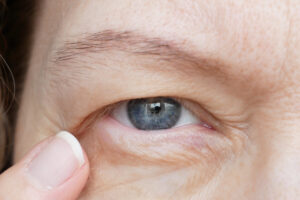
Dr. Daniel Tresley, M.D., a board-certified ophthalmologist and one of the few oculofacial plastic surgeons in the Chicago area, specializes in ptosis correction, helping patients restore both vision and facial aesthetics. With over 10,000 successful surgeries, Dr. Tresley combines extensive experience and an artistic approach to treat droopy eyelids, ensuring patients look refreshed and improve their overall eye function.
Visible Drooping of the Eyelid
The most obvious sign of ptosis is the noticeable sagging of one or both upper eyelids. This drooping may range from subtle to severe, where the eyelid covers part or all of the pupil. People with ptosis often find that one eyelid sits lower than the other, creating an uneven or asymmetrical appearance.
Obstructed Vision
If the eyelid droops far enough to cover the pupil, it can interfere with your field of vision. This is particularly problematic when driving, reading, or performing activities that require clear eyesight. In severe cases, ptosis may cause chronic headaches due to eye strain as your forehead muscles work harder to lift the eyelid.
Difficulty Keeping Eyes Open
People with ptosis often feel like their eyelids are heavy or tired, even after a full night’s sleep. This feeling of fatigue can make it difficult to keep the eyes open, especially towards the end of the day or during prolonged periods of focus.
Raised Eyebrows or Tipping the Head
To compensate for the drooping eyelid, many individuals subconsciously raise their eyebrows or tilt their head back to improve their vision. If you frequently adjust your posture or facial expressions to see better, ptosis could be the cause.
Increased Tearing or Dryness
Ptosis can also lead to other eye-related symptoms like excessive tearing or dryness, as the eyelid may not properly spread tears evenly across the eye’s surface.
Restore Your Eyelids with Ptosis Treatment in Northbrook, IL
If you’re experiencing any of these symptoms, it’s important to consult with a specialist. Ptosis can develop gradually due to aging or appear suddenly due to nerve or muscle issues. Call us today at 847-291-6900 to schedule a consultation with Dr. Tresley. Early diagnosis can prevent more complications and improve your quality of life.
